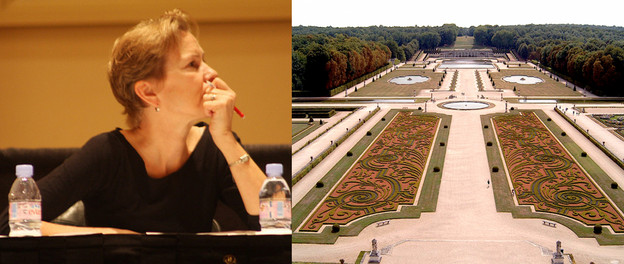
Cole Swensen responds

What follows is a response to PoemTalk #52 written by Cole Swensen, whose poem “If a Garden of Numbers” is discussed by Al Filreis, Ann Seaton, Gregory Djanikian and Michelle Taransky in that show.
I wanted to respond to the reading given to one of my poems in a recent number of PoemTalk. I was thrilled to hear that it was on the program because it’s such a wonderful series, but then I was disappointed to hear the actual discussion. It seemed dominated by Ann Seaton’s very particular agenda, which is an extremely important one, but not the only lens through which to look at 17th-century French gardens.
As Seaton herself stated, she was interested in “everything that wasn’t in the poem,” but because of that, what is in the poem never got addressed. Even its basic subject — the construction of the concept of nature by the sciences, which characterizes the modern world — wasn't discussed, nor was the dominant image in the poem, the golden section. And by extension, geometry as a whole, and with it, perspective, subject positioning, and the constitution of collective subjectivity were all left out. Discussing these, which are the agenda of the poem, might have opened the talk up to the critique attempted by many parts of the book.
My second point concerns Seaton’s reading of the last three lines, and particularly the “we” at its center (“There is nothing that controls our thoughts / more than what we think we see, / which we label “we.”). That she could have missed the irony there astonished me! Yes, the “we” is narrow, and yes, that’s a problem. I intended to criticize such practices, not recommend them.
And third, in saying that “Spaces like this are not open,” Seaton is actually not correct. Contemporary French society has profound problems with racism and equal access to higher education, employment, and political participation, but — again with painful irony — the former pleasure grounds of the aristocracy, with the exceptions of the few that are still in private hands, are open to everyone. There is sometimes a fee, and they are not all accessible by public transport, but no one asks your name at the gate, and no one is denied access.
That said, my over all goal was not to address the social conditions of the age, but to draw the portrait of a man, to write a poetic biography that dealt in part with the way in which he (as does everyone) constructed himself through selective seeing. But perhaps there is no legitimate subject for poetry, indeed any art, other than social conditions, and perhaps we are at a moment in which this is particularly true.
One last note, about kindness — I didn’t mean it frivolously; I think kindness is an extremely important social force, though it’s necessarily intimate, which means not only that it’s rarely noticeable by a society as a whole, but also that it almost never leaves an historical trace. I was struck by the fact that in André Le Nôtre’s case it did.
My thanks to the four who engaged with my poem in early May, and many thanks especially to Al Filreis, PennSound, and Jacket2 for the excellent series.